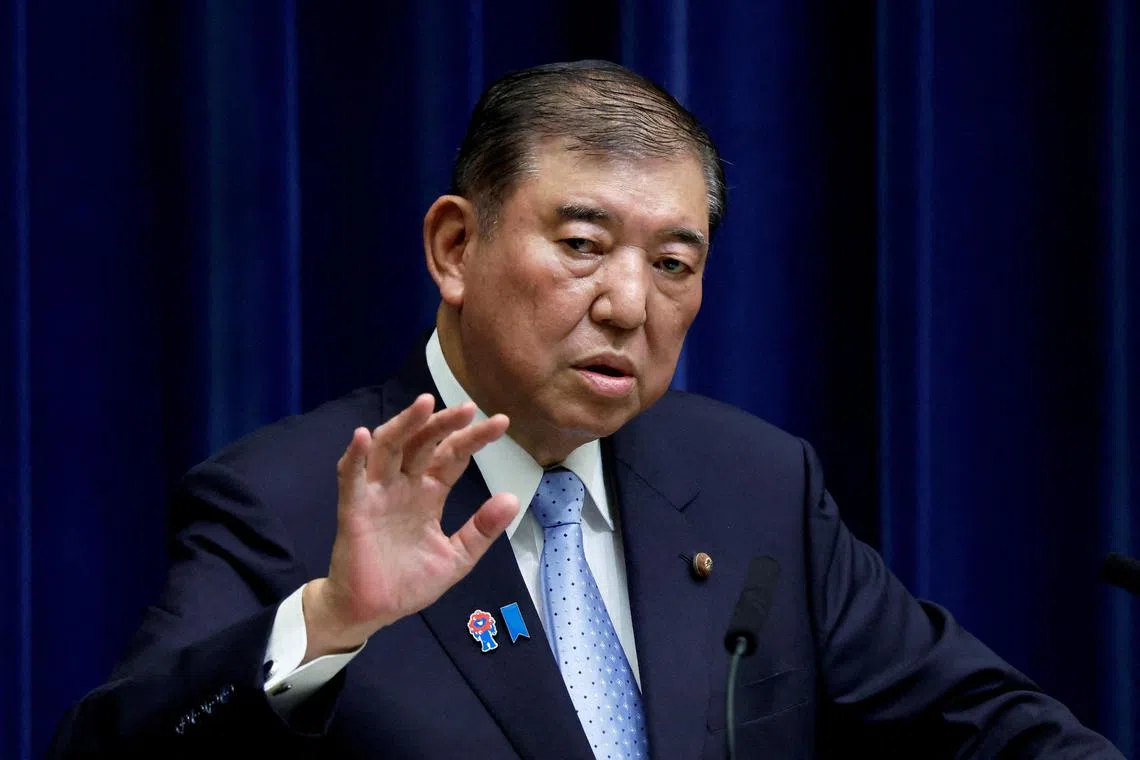Polls suggest tough election ahead for Japan PM Ishiba
Sign up now: Get insights on Asia's fast-moving developments

Japanese Prime Minister Shigeru Ishiba has headed a minority government since last October when he led the LDP to its worst general election result in years.
PHOTO: REUTERS
Tokyo - Japan’s unpopular ruling coalition faces tough Upper House elections this weekend, opinion polls suggested, potentially ending Mr Shigeru Ishiba’s premiership in less than a year.
Mr Ishiba, 68, has headed a minority government since last October when he led the long-dominant Liberal Democratic Party (LDP) to its worst general election result in years.
The new surveys indicate that the ruling coalition of the LDP and the smaller Komeito party could lose its Upper House majority on July 20 when 125 out of 248 seats are up for grabs.
The ruling bloc is “on course” to lose the majority, Kyodo News said on July 15, citing its latest poll.
It “would likely trigger calls for Prime Minister Shigeru Ishiba’s resignation”, Kyodo said.
Voters are unhappy about inflation – in particular, the price of rice – and scandals within the LDP, which has governed Japan almost uninterrupted for decades.
Since the October debacle – Mr Ishiba called early elections after winning the LDP leadership last September – his coalition has been in a minority.
This has made the Prime Minister obliged to rely on opposition parties to pass legislation, and losing the Upper House majority would put him in a bind there, too.
Mr Ishiba has set a target for the coalition to win 50 Upper House seats to maintain the majority, a level that in previous years would have seemed easy.
Kyodo, echoing other media surveys, predicted that the LDP would likely garner fewer than 40 seats, with Komeito also facing difficulties maintaining its 14 seats that are being contested.
The top-selling Yomiuri Shimbun newspaper on July 16 also said the LDP could potentially win only 24 seats – or 39, at most – and Komeito between seven and 13.
“Maintaining a majority is becoming a difficult situation,” Yomiuri said.
Projected to lose
The influential Nikkei business daily also said the ruling bloc was projected to “lose significantly” and its prospects to keep the majority were in doubt.
Small, opposition parties with anti-establishment messages are seen as peeling support away from the LDP.
The anti-immigration Sanseito party, in particular, is enjoying significant momentum and may win more than 10 seats, up from two currently.
“They put into words what I had been thinking about but couldn’t put into words for many years,” a 44-year-old voter told AFP at a recent Sanseito rally.
“When foreigners go to university, the Japanese government provides subsidies to them, but when we were going to university, everyone had huge debts,” she said.
The last time the LDP and Komeito failed to win a majority in the Upper House was in 2010, having already fallen below the threshold in 2007.
That was followed by a rare change of government in 2009, when the now-defunct Democratic Party of Japan won a Lower House majority.
It governed for a rocky three years that included the 2011 earthquake and Fukushima nuclear disaster before the LDP won a landslide victory in 2012.
If it loses the majority on July 20, “Ishiba may need to step down”, said Professor Toru Yoshida from Doshisha University.
Japanese politics “will step into an unknown dimension of the ruling government being a minority in both the Lower House and Upper House, which Japan has never experienced since World War II”, he said. AFP


